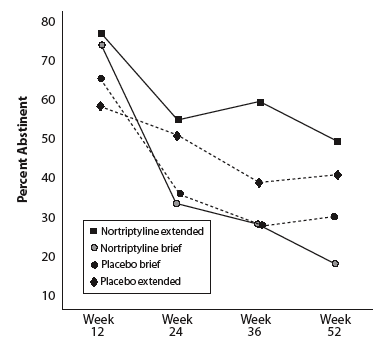Most smokers understand the health risks associated with tobacco use and want to stop, but the addictive grip of nicotine makes quitting difficult; nearly 80 percent of smokers who try relapse within a year. Those poor odds can be improved, NIDA-supported investigators say, by extending the length of smoking cessation therapy to at least 1 year.
Among smokers who received medication and counseling for 12 months rather than the conventional 12 weeks, half were abstinent a year after quitting. This is more than double the success rate of other treatment programs, says Dr. Sharon Hall, who investigated the extended treatment approach at the University of California, San Francisco. "Smoking is not just a bad habit; it is a powerful and deadly addiction," Dr. Hall says. "It has to be treated with methods that are commensurate with its addictive properties, which are extensive and long term."
 Smoking Cessation Rates Improve With Year-Long Treatment. After an initial 12-week therapy regimen, patients who received monthly counseling for 40 more weeks maintained higher abstinence rates than patients who did not. Concurrent nortriptyline therapy enhanced the advantage of extended counseling.
Smoking Cessation Rates Improve With Year-Long Treatment. After an initial 12-week therapy regimen, patients who received monthly counseling for 40 more weeks maintained higher abstinence rates than patients who did not. Concurrent nortriptyline therapy enhanced the advantage of extended counseling.Dr. Hall and her colleagues assigned each of 160 trial participants who smoked 10 or more cigarettes daily to one of four regimens. All the participants received nicotine replacement therapy (transdermal patch) and took part in five group counseling sessions during the first 12 weeks of the study. These 90-minute sessions concentrated on understanding health issues associated with smoking and quitting, developing personalized quit strategies, and avoiding relapse. The investigators gave half the participants a placebo and half nortriptyline, an antidepressant that Dr. Hall's research group had previously found helps smokers to quit. The researchers adjusted participants' medication doses to maintain blood concentrations of 50 to 150 ng/L.
At the end of 12 weeks, treatment ended for half of the participants. The rest continued their regimens of nortriptyline (40) or placebo (41) for 40 more weeks. During this time, they continued to participate in monthly 30-minute group counseling sessions and were contacted by phone 2 weeks after each session to reinforce counseling lessons.
At the end of weeks 24, 36, and 52, far fewer of the participants in extended treatment were smoking than were participants whose treatment ended after 12 weeks. At the end of 1 year, 50 percent of patients who had received nortriptyline and counseling throughout were abstinent, compared with 18 percent who got this treatment for only 12 weeks. Forty-two percent of patients who received extended counseling and placebo were abstinent at 1 year, compared with 30 percent of those who got them for 12 weeks.
"The highest success rate was with nortriptyline and counseling for 52 weeks," Dr. Hall says. "Extended treatment with placebo and counseling came in a very close second, suggesting that prolonged psychological support and counseling are important components in improved treatment outcomes." The mix of long-term combination treatment with both pharmacological and behavioral therapies reflects the complexity and power of smoking addiction, says Dr. Hall. "Smoking is more complex than just the physical addiction. There are psychological factors such as stress that can trigger a desire to smoke. There are social and environmental factors—a certain group of friends or a certain kind of meal or a certain type of gathering—that make a contribution, too," Dr. Hall says. "Simply treating the physical addiction doesn't address these psychological influences, which can trigger a relapse to smoking months or years after a person has quit."
"These findings are significant because they show that a combination treatment provided over an extended period has great potential to improve smoking cessation rates," says Ms. Debra Grossman of NIDA's Division of Neuroscience and Behavioral Research. "Dr. Hall has shown that providing smokers with a comprehensive extended treatment can achieve better abstinence rates than have ever previously been reported from a controlled trial."
Dr. Hall and her colleagues are continuing to test long-term treatments in two other studies. One involves smokers older than 50, a group with markedly poorer outcomes than younger smokers. The second will evaluate bupropion, a prescription medication specifically approved for smoking cessation treatment, in combination with counseling.
For some smokers, the prospect of a year-long course of treatment is daunting, Dr. Hall acknowledges. "But this may be what you need to do if you want to be successful. Smokers, as well as the practitioners who treat them, need to know that it is possible to achieve high rates of long-term abstinence. It is not a simple process because it's not a simple addiction. But it is worth it to stop doing something that can kill you."
Source
- Hall, S.M., et al. Extended nortriptyline and psychological treatment for cigarette smoking. American Journal of Psychiatry 161(11):2100-2107, 2004. [Full Text]
